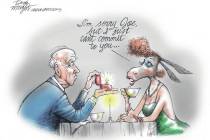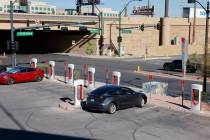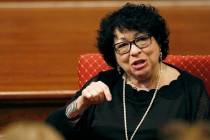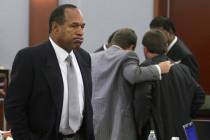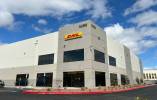EDITORIAL: Property tax caps
Nevada governments face two very inconvenient realities about state tax policy.
First, Nevada’s property tax caps were enacted in 2005 specifically to prevent governments from ever realizing a revenue windfall as a result of unusually rapid appreciation in land, home and building values.
Second, tax collections are subject to the fluctuations of the economy. Tax revenues eventually fall during times of recession and periods of high joblessness, and increase during times of economic growth and low unemployment. Yes, some tax revenue streams are more volatile than others. But the cries from all corners of this state for a “stable” tax structure that’s immune to the “boom and bust” cycles of the economy amount to wasted breath. There is no system of taxation — none that is remotely fair, anyway — that can guarantee governments ever-rising revenues without the risk of declining collections.
But these realities won’t stop Southern Nevada’s local governments from demanding changes to the property tax caps, which limit annual bill increases to 3 percent for owner-occupied homes and 8 percent for rental homes and commercial properties. The valley’s real estate boom of a decade ago did not result in accompanying growth in property tax collections, but the subsequent housing collapse sent those revenues tumbling. Now that property values are again rising, governments are complaining that property tax collections aren’t growing fast enough to make up for the revenue declines of the Great Recession.
These are not unintended consequences. The caps are working exactly as they should. The private sector was forced to reset to new economic conditions, but governments have been slow to reform their practices and largely unable to control the growth of personnel costs because of the bargaining power of public employee unions.
Calls to change the caps are not “reforms.” They are calls for massive tax increases that, if enacted, will lead to massive government spending increases. And those spending increases will have to be dialed back when the next recession hits, starting the cycle of agitation for tax increases anew.
Assembly Speaker Marilyn Kirkpatrick, D-North Las Vegas, has some ideas to boost property tax collections from commercial properties. As reported this month by the Review-Journal’s Sean Whaley, Ms. Kirkpatrick next year will propose changes to the way the Board of Equalization reduces parcel values based on declining business income, with the goal of resetting commercial property values to higher levels.
It’s worth reminding our elected leaders that more than one-third of Nevada mortgages are still underwater, and that although Nevada’s unemployment rate has fallen below 9 percent and the economy is picking up, far too many people are out of work. Nevada should encourage job creation, not discourage it by hitting businesses with higher property tax bills. Leave the caps alone.
Instead of collecting more tax money from Nevadans, governments should focus on spending less.








